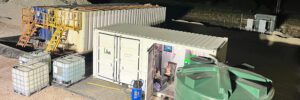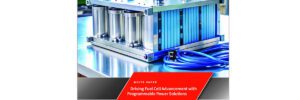
Battery metal producer Litus recently announced results from its Litus LiNC pilot unit deployed in Texas. After processing thousands of liters of brine, the system achieved over 98% sustained lithium removal. Litus says this demonstrates that its LiNC process is both technically ready to scale and commercially profitable.
At the heart of Litus’s process is the company’s proprietary LiNC nanocomposite, designed and manufactured in-house. Using the Litus nanocomposite, the company’s pilot has demonstrated consistent performance across variable brine chemistries. Litus reports that its material operated continuously, seven days a week, for over 5,000 pumping hours with no decline in the nano’s capacity.
Unlike other methods that depend on costly purified water, Litus LiNC operates effectively with fresh municipal water, and it requires only approximately 8 kWh of energy per cycle.
Litus’s process is fully automated and controlled remotely. Data from the extraction site is streamed to Litus’s Calgary facility, where system performance is constantly monitored and controlled. The thousands of data points collected from the field are critical for process optimization and insights, says the company.
“These results are a turning point,” said Dr. Ghada Nafie, CEO and co-founder of Litus. “For years, the industry has been searching for a direct lithium extraction technology that is sustainable, efficient, reliable, and truly scalable. With Litus LiNC, we have achieved that vision. This pilot proves our technology works in the field with consistency, efficiency, and economics that will transform the lithium industry.”
Source: Litus
from Charged EVs https://ift.tt/gLeq3XP



No comments:
Post a Comment